Columbia College | Columbia University in the City of New York
Take Five with Mae Smith ’14

LEONARDO STEDILE
What were you like when you arrived at Columbia?
Frankly, I was a robot! In high school, we’re encouraged to do as many things and activities as possible — a long résumé is more important than a thorough résumé: Results are more important than experience. This, we are taught, is how you get into the college of your dreams. When I arrived at Columbia, I hadn’t yet shed this mentality. It took a lot of burnout and some peer-inspired introspection to re-examine this perspective. I gradually slowed down and rejected stress as a status symbol. I learned to prioritize process over result. Discourse became more important than test scores. Engaging deeply with work that interested me eclipsed the impulse to pack as much into my schedule as humanly possible.
What do you remember about your first-year living situation?
I was on Carman 7, which that year had a disproportionately large number of international students. My roommate was Ethiopian, my best friends were Sri Lankan and Guatemalan. Everyone on that floor had an incredibly different upbringing and story to tell. I remember a group of us often sitting on the floor of the hallway, talking all night about past experiences, insecurities and current struggles. Those conversations taught me how to be open with other people. Our collective vulnerability made all of us stronger. Something unique about that year, particularly for me as an only child, was that I was rarely alone. We’d work in groups, even when we were working on different assignments. Sometimes, we’d get through lengthy readings for Lit Hum by reading them out loud together, popcorn style. One of my strangest and most wonderful memories was reading a portion of The New Testament out loud with a group that had wildly different religious upbringings and beliefs. Our discussion that night, which lasted past sunrise, was intimate and fascinating far beyond any class.
What class do you most remember and why?
“Advanced Screenwriting” with the late, great Guy Gallo was completely transformative for me. It taught me how to use my emotions, rather than push them away. Whenever we presented pages to the class, Professor Gallo made us read them out loud, alone, the whole thing. We read the action, we read each character’s dialogue. It was painful and tedious and incredibly valuable. It made you hear every mistake, catch every typo. You could tell when all of your characters sounded the same, or when they didn’t speak like real people. You got an incomparable sense of pacing. But the most valuable part of this practice was that you were made acutely aware of which parts of your script felt embarrassing or raw. I wrote a screenplay in that class which, by and large, had nothing to do with me. There was one scene in it, however, that was based on my family’s experience during 9-11. When I came to that scene as I was reading my new pages aloud, I paused. I realized in the moment how much I didn’t want to read those words. I pushed through, my voice shaking throughout the whole scene. The class was as rapt as I was uncomfortable. I felt naked. Afterward, Professor Gallo told me it was the best piece of writing I’d brought in so far. He showed me how to mine vulnerability for impact. Aside from this deeper lesson, Professor Gallo was the first person to tell me that I should pursue television writing. He said my style and my demeanor — the way I was in the room — were well suited for it. He also suggested I try my hand at comedy, which I honestly had never before considered. He left an indelible mark on my life, and his presence in the world is greatly missed. I’m heartbroken that future students will never be able to meet him.
Did you have a favorite spot on campus, and what did you like about it?
I spent an inordinate amount of time on the 15th floor of the International Affairs Building! The view of the city is amazing from there, and it was good to remind myself that there was a lot of life happening off campus. It helped me keep my perspective in check and calm down when things were stressful. In the evenings, it was often empty. I wrote papers there, read books, did yoga and had long, memorable conversations with friends. It was a little pocket of peace for me.
What, if anything, about your College experience would you do over?
I think the main thing is I would produce more content. There were resources through the university — Columbia Undergraduate Film Productions, the J-School media lab, student theater groups — that make it so easy to try things out creatively. That kind of experimentation is a lot more expensive post-grad. I did a lot of creative projects while I was in school, but in retrospect I would have pushed to produce more and to get professors more involved. Your time will never be as wholly yours as it is in college. Take advantage of that as much as you can!

